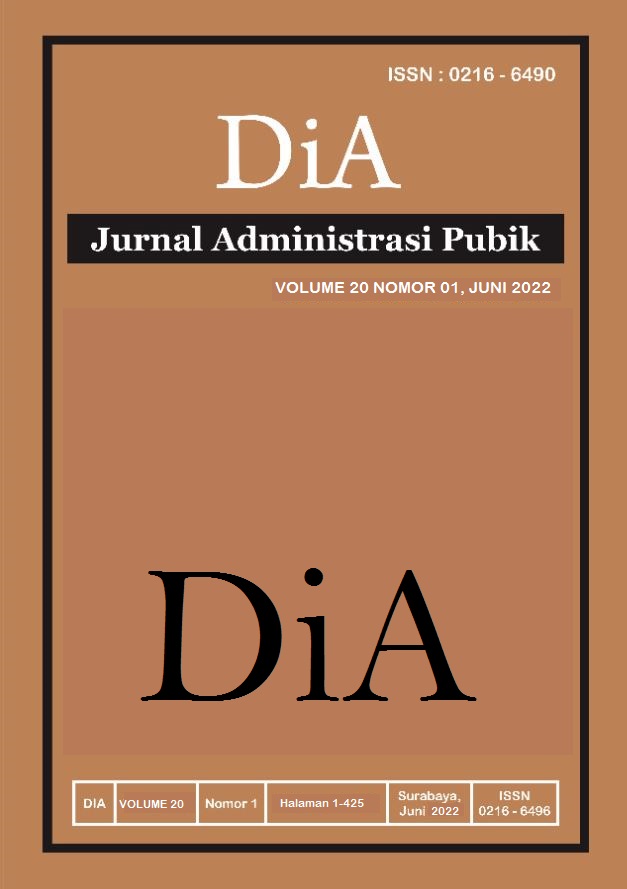THE EFFECT OF WORK CULTURE AND WORK MOTIVATION ON THE PERFORMANCE OF CENTRAL BPS EMPLOYEES
DOI:
https://doi.org/10.30996/dia.v20i01.6062Keywords:
Work Culture, Work Motivation, Employee PerformanceAbstract
Simplification of the bureaucracy with minimal structure but rich in functions led to changes in the work culture of employees. Employees are required to be more proactive at work, not just waiting for instructions from the leadership to work. This study aims to determine the effect of work culture and work motivation on employee performance at Central BPS. This type of research is quantitative research. The population in this study were all civil servants of BPS on Jl. dr Soetomo Jakarta, totaling 1429 employees. Sampling was done by means of systematic sampling, as many as 303 employees. Data collection was carried out by survey method using google form. Data were analyzed by simple and multiple linear regression. Based on calculations using the Weight Least Square method for the variables of Work Culture (X1), Work Motivation (X2), and Employee Performance (Y), the regression equation can be made as follows Y= -1.1218 + 0.9203 X1 + 0.1180 X2. The results showed that work culture and work motivation simultaneously had a significant effect on the performance of Central BPS employees by 94.13 percent, while the remaining 5.87 percent was explained by other variables that were not included in the model used in the study. Partially, work culture and work motivation have a significant effect on the performance of Central BPS employees. The findings in this study are that sincere attitude is a work culture that has a strong influence on improving the performance of Central BPS employees and good interpersonal relationships can motivate Central BPS employees to improve their performance. To further strengthen the work culture, the organization's core values should be stated in operational standards for the implementation of activities/tasks.
Downloads
References
Apandi, Y dan FS. (2019). Kinerja Pegawai Universitas Lampung Ditinjau dari Gaya Kepemimpinan dan Motivasi Kerja. Cendekia, 13(1), 19-32, doi:10.30957/cendekia.v13i1.54.
Fransisca. (2014). Pengaruh Motivasi Kerja dan Kepuasan Kerja terhadap Kinerja Karyawan CU (Credit Union) Tilung Jaya Kecamatan Putusibau. Jakarta: Program Pascasarjana Universitas Terbuka.
Hasdiah dkk (2018). Pengaruh Motivasi dan Budaya Kerja terhadap Kinerja Pegawai di Kantor Sekretariat Daerah Kabupaten Enrekang, Prosiding Konferensi Nasional ke-8 Asosiasi Program Pascasarjana Perguruan Tinggi Muhammadiyah (APPPTMA), Medan.
Hasibuan, M.S.P. (2016). Organisasi & Motivasi (Dasar Peningkatan Produktivitas). Jakarta: Bumi Aksara.
Herzberg, Frederick. (2018). Herzberg’s Motivation-Hygiene Theory and Job Satisfaction. Sunway University Malaysia.
Herzberg, F., Mausner, B., & Snyderman, B.B (1959). The Motivation to Work, New York: John Wiley & Sons, 2nded.
Intan (2017). Pengaruh Motivasi Kerja, Budaya Kerja dan Komunikasi terhadap Kinerja Pegawai Dinas Perhubungan, Komunikasi dan Informatika Kota Palu. E Jurnal Katalogis, 5(6), 120-127.
Kusbandono, Danu (2018), Penerapan Budaya Kerja dan Motivasi Kerja dalam rangka Peningkatan Kinerja Pegawai pada Dinas Pariwisata dan Kebudayaan Kabupaten Lamongan, Jurnal Penelitian Ilmu Manajemen, 3(3).
Luthans, Fred. (2011). Organizational Behaviour 12thed. New York: Mc Graw-H.11 Companies.
Maulina, C.S .(2020). Budaya Kerja Aparatur Sipil Negara pada Kantor Camat IDI Tunong Kabupaten Aceh Timur. Medan: Tesis Universitas Sumatera Utara
Oktawati, D. (2016). Pengaruh Kompensasi dan Motivasi terhadap Kinerja Pegawai pada Dinas Pendapatan Pengelolaan Keuangan dan Aset Daerah Kabupaten Sarolangun (DPPKAD). Jakarta: TAPM Universitas Terbuka.
Rahayu, K.P. (2010). Pengaruh Budaya Kerja dan Kepemimpinan Terhadap Kinerja Pegawai di Lingkungan Mahkamah Konstitusi. Jakarta: Tesis Program Studi Ilmu Administrasi Kekhususan Administrasi dan Kebijakan Publik Universitas Indonesia.
Robbins, Stephen. P. (2001). Organizational Behavior. Upper Saddle River, New Jersey: Prentice Hall Inc.
Downloads
Published
How to Cite
Issue
Section
License
The DiA journal allows authors to retain the copyright of their papers without limitation. Authors may grant publishers non-exclusive publishing rights to publish articles. Granting first publishing rights to publishers also qualifies as unlimited copyright (because there are no restrictions imposed by publishers on author copyright).







